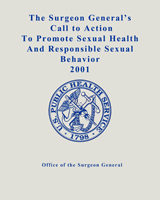NCBI Bookshelf. A service of the National Library of Medicine, National Institutes of Health.
Office of the Surgeon General (US); Office of Population Affairs (US). The Surgeon General's Call to Action to Promote Sexual Health and Responsible Sexual Behavior. Rockville (MD): Office of the Surgeon General (US); 2001 Jul.

The Surgeon General's Call to Action to Promote Sexual Health and Responsible Sexual Behavior.
Show detailsStrategies that cover three fundamental areas--increasing awareness, implementing and strengthening interventions, and expanding the research base-could help provide a foundation for promoting sexual health and responsible sexual behavior in a manner that is consistent with the best available science.
1. Increasing Public Awareness of Issues Relating to Sexual Health and Responsible Sexual Behavior
- Begin a national dialogue on sexual health and responsible sexual behavior that is honest, mature and respectful, and has the ultimate goal of developing a national strategy that recognizes the need for common ground.
- Encourage opinion leaders to address issues related to sexual health and responsible sexual behavior in ways that are informed by the best available science and that respect diversity.
- Provide access to education about sexual health and responsible sexual behavior that is thorough, wide-ranging, begins early, and continues throughout the lifespan. Such education should:
- recognize the special place that sexuality has in our lives;
- stress the value and benefits of remaining abstinent until involved in a committed, enduring, and mutually monogamous relationship; but
- assure awareness of optimal protection from sexually transmitted diseases and unintended pregnancy, for those who are sexually active, while also stressing that there are no infallible methods of protection, except abstinence, and that condoms cannot protect against some forms of STDs.
- Recognize that sexuality education can be provided in a number of venues-homes, schools, churches, other community settings-but must always be developmentally and culturally appropriate.
- Recognize that parents are the child's first educators and should help guide other sexuality education efforts so that they are consistent with their values and beliefs.
- Recognize, also, that families differ in their level of knowledge, as well as their emotional capability to discuss sexuality issues. In moving toward equity of access to information for promoting sexual health and responsible sexual behavior, school sexuality education is a vital component of community responsibility.
2. Providing the Health and Social Interventions Necessary to Promote and Enhance Sexual Health and Responsible Sexual Behavior
- Eliminate disparities in sexual health status that arise from social and economic disadvantage, diminished access to information and health care services, and stereotyping and discrimination.
- Target interventions to the most socioeconomically vulnerable communities where community members have less access to health education and services and are, thus, likely to suffer most from sexual health problems.
- Improve access to sexual health and reproductive health care services for all persons in all communities.
- Provide adequate training in sexual health to all professionals who deal with sexual issues in their work, encourage them to use this training, and ensure that they are reflective of the populations they serve.
- Encourage the implementation of health and social interventions to improve sexual health that have been adequately evaluated and shown to be effective.
- Ensure the availability of programs that promote both awareness and prevention of sexual abuse and coercion.
- Strengthen families, whatever their structure, by encouraging stable, committed, and enduring adult relationships, particularly marriage. Recognize, though, that there are times when the health interests of adults and children can be hurt within relationships with sexual health problems, and that sexual health problems within a family can be a concern in and of themselves.
3. Investing in Research Related to Sexual Health and Disseminating Findings Widely
- Promote basic research in human sexual development, sexual health, and reproductive health, as well as social and behavioral research on risk and protective factors for sexual health.
- Expand the research base to cover the entire human life span-children, adolescents, young adults, middle age adults, and the elderly.
- Research, develop, disseminate, and evaluate educational materials and guidelines for sexuality education, covering the full continuum of human sexual development, for use by parents, clergy, teachers, and other community leaders.
- Expand evaluation efforts for community, school and clinic based interventions that address sexual health and responsibility.
- VI. Vision for the Future - The Surgeon General's Call to Action to Promote Sexu...VI. Vision for the Future - The Surgeon General's Call to Action to Promote Sexual Health and Responsible Sexual Behavior
Your browsing activity is empty.
Activity recording is turned off.
See more...